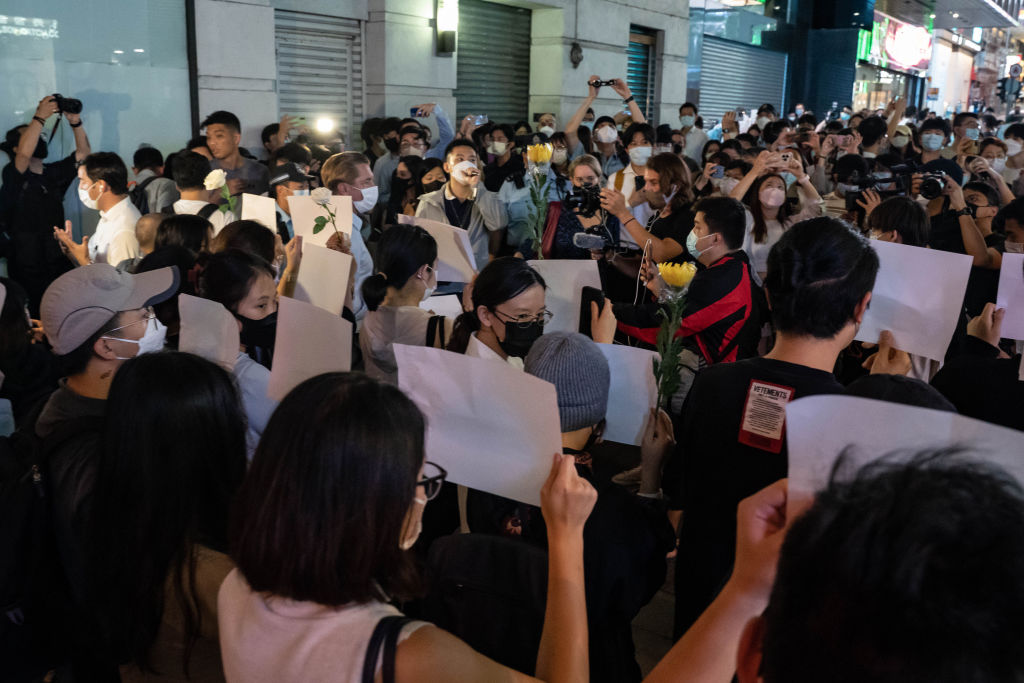It is easy to imagine that a dam might be bursting in China. There have been spontaneous street protests across the country against the country’s zero Covid policy, unconfirmed videos in Shanghai show crowds calling for president Xi Jinping to resign, and political content is slipping though China’s draconian social media censorship.
Earlier in the pandemic, Chinese residents in Covid-stricken cities were trapped in their apartment buildings while, in one memorable dystopian moment, a horde of drones deployed by the local communist party told them to ‘control your soul’s desire for freedom’. Now, after a fire in a residential block in Urumqi killed ten people, it seems as though people have suddenly had enough.
The story of this century has been the CCP consolidation of power
Many international outlets are correctly suggesting this new wave of public dissention is a ‘challenge’ to the Chinese Communist Party and its obsessive and doomed desire to prevent Covid from establishing a visible presence in the country. But it is too soon to say whether China is on the verge of Iran-style protests, possibly shaking the foundations of its totalitarian state. Public discontent is real, and justified. The Communist party has once again – as it is apt to do – made things worse. But that does not mean that freedom is but a few mass demonstrations away.
It is worth keeping in mind what happened to Hong Kong within the space of the last five years, and within 25 years of the 1997 handover. As a reminder, Hong Kong used to have fairly free elections and a media with outlets not under communist party control. Not anymore.
Hong Kong’s downfall began when the executive proposed a bill in 2019 which would have made a mockery of the region’s legal separation from the mainland. At the same time, Hong Kong residents who sold books and magazines of which Beijing disapproved were mysteriously kidnapped, dragged across the border, and filmed in CCP courts, bleary eyed from their mistreatment.
Those who believed the Chinese state when it signed the Sino-British Joint Declaration, and made promises to protect Hong Kong’s separate legal system, suddenly found themselves disillusioned and in danger. And those in Hong Kong who had only known Chinese rule suddenly saw their futures disappearing before their eyes. They went out to protest in the summer of 2019 and were viciously beaten, imprisoned on fabricated charges, and generally had their lives made hell.
These demonstrations, for all their spirit and bravery, were entirely unsuccessful. Beijing even used the protests to pass a draconian national security law in 2020 which effectively makes dissent a treasonable offense. It used the cover of protests to close independent newspapers and news websites in Hong Kong, and to imprison journalists and former newspaper owners for ‘collusion with foreign forces’. It installed Beijing’s pet policeman as Hong Kong’s chief executive.
And finally, to add insult to injury, at Beijing’s suggestion, the laws governing elections in Hong Kong were changed, so that only sufficiently ‘patriotic’ parties and candidates could stand.
For the Hong Kong demonstrators, this was a comprehensive defeat.
Now, Hong Kong is not China proper. It’s easier to simply flood smaller places like Hong Kong with more police to suppress dissent. And as analysts were fond of telling us 30 years ago, China theoretically could break up or become a looser federation if the centre becomes too domineering. It has done so before. Dictators beware.
And yet, the story of this century has been the CCP consolidation of power – into its own hands and then, after 2012, into the hands of a single person: Xi Jinping, the new Mao. Xi Jinping, meanwhile, has built a surveillance and concentration camp network unlike anywhere in the world to date. First this was tested on western provinces with troublesome ethnic and religious minorities; then it became more widespread. The pandemic was its testing ground, and before this week mass surveillance and mass imprisonment seemed, sadly, to work. Already we are seeing reports that the police in China are clamping down on this week’s protestors, with some gatherings cancelled as a result.
And the siren voices who said that China would become simply too difficult to govern autocratically have become less convincing as time goes on. This is similar to the way Hong Kong’s democracy and legal independence was said to be sacrosanct and difficult to undermine – until it was not.
China’s communist government is probably quite afraid of these new protests. They are seemingly sincere, spontaneous and widely supported. This is good and, to a small extent, heartening. But that does not mean they will succeed. The violent toolkit of the CCP is near to hand and is brutally effective. I wish the demonstrators luck. They are going to need it.






Comments